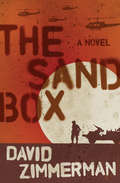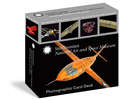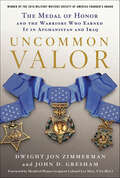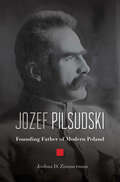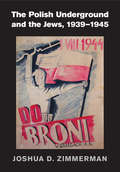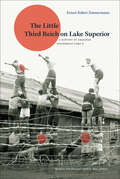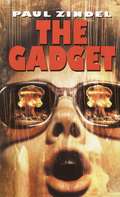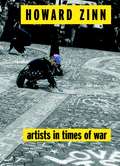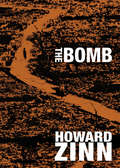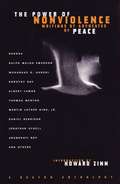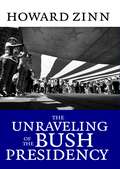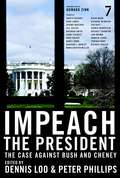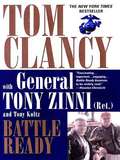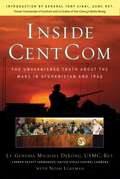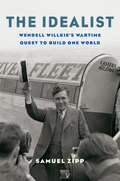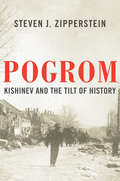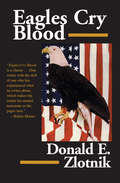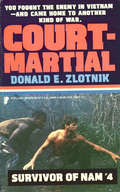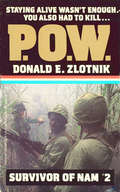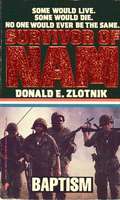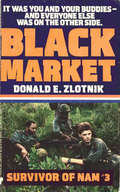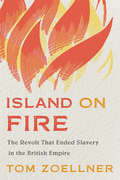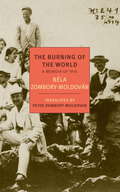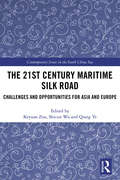- Table View
- List View
The Sandbox: A Novel
by David ZimmermanThis “gripping” and suspenseful novel of the Iraq War “will keep you turning the pages” (The New York Times). Operating Base Cornucopia is a three-hundred-year-old fortress in the remote Iraqi desert where a few dozen soldiers wait for their next assignment, among them Pvt. Toby Durrant, a self-described “broke nobody.” Then a deadly ambush touches off events that put Durrant in the middle of a far-reaching conspiracy. Insurgents massing in the nearby hills, a secretive member of military intelligence, an abandoned toy factory, and a mysterious, half-feral child—Durrant must figure out the links between them if he’s to survive. This blistering look at military life in “the sandbox” of Iraq is both a compelling mystery and a vivid evocation of an “isolated moonscape—a place as liable to produce hallucinations and heat exhaustion as it is to churn up sandstorms that last for days” (Los Angeles Times).
Smithsonian National Air and Space Museum Photographic Card Deck: 100 Treasures from the World's Largest Collection of Air and Spacecraft
by Dwight Jon ZimmermanCreated in partnership with the world-renowned Smithsonian National Air and Space Museum, this beautifully packaged, informative card deck captures, in words and stunning photographs, 100 of the museum's most important artifacts. The NASM is the world's largest, most-visited collection of historical aircraft and spacecraft, and commemorate major milestones in flight and space exploration. The 100 treasures in this deck, hand-selected by the curators, include the Spirit of St. Louis, flown by Charles Lindbergh on the first non-stop transatlantic flight; Chuck Yeager's Bell X-1, in which he broke the sound barrier; Buzz Aldrin's space suit, worn during the Apollo 11 mission, and the Space Shuttle Discovery, which flew 39 missions and spent 365 days in space. Each card includes a photograph of the object on the front and a 200-word description plus key data on the back.
Uncommon Valor: The Medal of Honor and the Warriors Who Earned It in Afghanistan and Iraq
by Dwight Jon Zimmerman John D. GreshamUncommon Valor from Dwight Jon Zimmerman and John D. Gresham presents a fascinating look at six of our bravest soldiers and the highest military decoration awarded in this country.Since the Vietnam War ended in 1973, the Medal of Honor, our nation's highest award for valor, has been presented to only eight men for their actions "above and beyond the call of duty." Six of the eight were young men who had fought in the current war in Iraq, Afghanistan, or both. All of these medals were awarded posthumously, as all had made the choice to give their lives so that their comrades might live. Uncommon Valor answers the searing question of who these six young soldiers were, and dramatically details how they found themselves in life-or-death situations, and why they responded as they did. For the first time, this book also provides a comprehensive history of the Medal of Honor itself—one marred by controversies, scandals, and theft. Using an extraordinary range of sources, including interviews with family members and friends, teammates and superiors in the military, personal letters, blogs posted within hours of events, personal and official videos and newly declassified documents, Uncommon Valor is a compelling and important work that recounts incredible acts of heroism and lays bare the ultimate sacrifice of our bravest soldiers.
Jozef Pilsudski: Founding Father of Modern Poland
by Joshua D. ZimmermanThe story of the enigmatic Jozef Pilsudski, the founding father of modern Poland: a brilliant military leader and high-minded statesman who betrayed his own democratic vision by seizing power in a military coup. In the story of modern Poland, no one stands taller than Jozef Pilsudski. From the age of sixteen he devoted his life to reestablishing the Polish state that had ceased to exist in 1795. Ahead of World War I, he created a clandestine military corps to fight Russia, which held most Polish territory. After the war, his dream of an independent Poland realized, he took the helm of its newly democratic political order. When he died in 1935, he was buried alongside Polish kings. Yet Pilsudski was a complicated figure. Passionately devoted to the idea of democracy, he ceded power on constitutional terms, only to retake it a few years later in a coup when he believed his opponents aimed to dismantle the democratic system. Joshua Zimmerman’s authoritative biography examines a national hero in the thick of a changing Europe, and the legacy that still divides supporters and detractors. The Poland that Pilsudski envisioned was modern, democratic, and pluralistic. Domestically, he championed equality for Jews. Internationally, he positioned Poland as a bulwark against Bolshevism. But in 1926 he seized power violently, then ruled as a strongman for nearly a decade, imprisoning opponents and eroding legislative power. In Zimmerman’s telling, Pilsudski’s faith in the young democracy was shattered after its first elected president was assassinated. Unnerved by Poles brutally turning on one another, the father of the nation came to doubt his fellow citizens’ democratic commitments and thereby betrayed his own. It is a legacy that dogs today’s Poland, caught on the tortured edge between self-government and authoritarianism.
The Polish Underground and the Jews, 1939–1945
by Joshua D. ZimmermanThe Polish Underground and the Jews, 1939–1945 examines one of the central problems in the history of Polish-Jewish relations: the attitude and the behavior of the Polish Underground - the resistance organization loyal to the Polish government-in-exile - toward the Jews during World War II. Using a variety of archival documents, testimonies, and memoirs, Zimmerman offers a careful, dispassionate narrative, arguing that the reaction of the Polish Underground to the catastrophe that befell European Jewry was immensely varied, ranging from aggressive aid to acts of murder. By analyzing the military, civilian, and political wings of the Polish Underground and offering portraits of the organization's main leaders, this book is the first full-length scholarly monograph in any language to provide a thorough examination of the Polish Underground's attitude and behavior towards the Jews during the entire period of World War II.
The Little Third Reich on Lake Superior: A History of Canadian Internment Camp R
by Ernest Robert ZimmermannAn in-depth history of one of Canada’s World War II internment camps that held both Nazis and anti-Nazis alike.For eighteen months during the Second World War, the Canadian military interned 1,145 prisoners of war in Red Rock, Ontario (about 100 kilometres northeast of Thunder Bay). Camp R interned friend and foe alike: Nazis, anti-Nazis, Jews, soldiers, merchant seamen, and refugees whom Britain feared might comprise Hitler’s rumoured “fifth column” of alien enemies residing within the Commonwealth. For the first time and in riveting detail, the author illuminates the conditions in one of Canada’s forgotten POW camps. Backed by interviews and meticulous archival research, Zimmermann fleshes out this rich history in an accessible, lively manner. The Little Third Reich on Lake Superior will captivate military and political historians as well as non-specialists interested in the history of POWs and internment in Canada.“Most of us have an image of what prisoner of war camps looked like, either from documentary footage about Nazi POW camps, or feature films about World War II, or television situation comedies. The Little Third Reich on Lake Superior shatters all of those stereotypes and, through diligent assembly of public records, multiple library archives and personal interviews, gives us an in-depth picture of a Canadian internment camp. All of this is skillfully organized in a reader-friendly, chronological way.” —Michael Sabota, Chronicle Journal“The study shines light on the lesser-known Canadian prisoner of war (POW) camps in World War II. In this well-researched study, Zimmermann describes not only Camp R, but the inmates, guards, military command structure, politicians, and general political environment in Canada and Britain. . . . The work is easy to read and deftly supported by a broad array of sources. Zimmermann’s analysis encompasses Canadian and British history. . . . The Little Third Reich on Lake Superior sets a high standard for future research into civilian internment camps.” —Anna Marie Anderson, The Journal of Military History
First Great Triumph: How Five Americans Made Their Country a World Power
by Warren ZimmermannAmerican history around 1900 with a focus on five figures.
The Gadget
by Paul ZindelNear the end of World War II, scientists in Los Alamos, New Mexico, are working on a project that will alter the fate of the world. Thirteen-year-old Stephen Orr is living at a top secret military base with his father who is building the atomic bomb.
Artists in Times of War (Open Media Series)
by Howard Zinn"Political power," says Howard Zinn, "is controlled by the corporate elite, and the arts are the locale for a kind of guerrilla warfare in the sense that guerrillas look for apertures and opportunities where they can have an effect." In Artists in Times of War, Zinn looks at the possibilities to create such apertures through art, film, activism, publishing and through our everyday lives. In this collection of four essays, the author of A People's History of the United States writes about why "To criticize the government is the highest act of patriotism." Filled with quotes and examples from the likes of Bob Dylan, Mark Twain, e. e. cummings, Thomas Paine, Joseph Heller, and Emma Goldman, Zinn's essays discuss America's rich cultural counternarratives to war, so needed in these days of unchallenged U.S. militarism.
The Bomb
by Howard ZinnAs a World War II combat soldier, Howard Zinn took part in the aerial bombing of Royan, France. Two decades later, he was invited to visit Hiroshima and meet survivors of the atomic attack. In this short and powerful book, Zinn offers his deep personal reflections and political analysis of these events, their consequences, and the profound influence they had in transforming him from an order-taking combat soldier to one of our greatest anti-authoritarian, antiwar historians. This book was finalized just prior to Zinn's passing in January 2010, and is published on the sixty-fifth anniversary of the bombing of Hiroshima.
The Power of Nonviolence: Writings by Advocates of Peace
by Howard Zinn[Back Cover] The Power of Nonviolence, the first anthology of alternatives to war with a historical perspective - with an introduction by Howard Zinn about September 11 and the U.S. response to the terrorist attacks -presents the most salient and persuasive arguments for peace in the last 2,500 years of human history. Arranged chronologically, covering the major conflagrations in the world, The Power of Nonviolence is a compelling step forward in the study of pacifism, a timely anthology that fills a void for people looking for responses to crises that are not based on guns or bombs. Included are some of the most original thinkers and writings about peace and nonviolence-Buddha, Scott Nearing, Henry David Thoreau's "Civil Disobedience," Jane Addams, William Penn on the end of war, Dorothy Day's "Pacifism," Erich Fromm, and Rajendra Prasad. Supplementing these classic voices are more recent advocations for peace: Albert Camus's "Neither Victims nor Executioners," A. J. Muste's impressive "Getting Rid of War," Martin Luther King's influential "Declaration of Independence from the War in Vietnam," and Arundhati Roy's "War Is Peace," plus many others.
The Unraveling of the Bush Presidency
by Howard ZinnHere, in the magisterial yet plain-spoken style of A People's History of the United States, is historian Howard Zinn's long-awaited telling of these last six years of United States history, a time when catastrophic machinations of war have dictated our foreign and domestic policy, and when voices of resistance have appeared in the unlikeliest places.Perhaps more than any other American, Howard Zinn has helped us understand ourselves by deepening our understanding of our own history.
Impeach the President: The Case Against Bush and Cheney
by Howard Zinn Dennis Loo Peter PhillipsThis brilliantly argued and wonderfully written collection by twenty-two of the best political analysts in the US analyzes the extraordinary and unprecedented threat the White House and its allies present to civil liberties, civil rights, the Constitution, international law, and the future of the planet. Impeach the President unearths the stories behind election fraud in 2000 and 2004, the overt lies used to justify pre-emptive war on Iraq, the extensive, ongoing commission of war crimes and torture, the tragic failures in the lead-up to and aftermath of Hurricane Katrina, and lesser-known but equally alarming offences of propaganda and disinformation, illegal spying, environmental destruction, and the violation of the separation of church and state. Loo and Phillips chillingly reveal the full threat behind the radical right-wing force that has taken over the world's most powerful office.
Battle Ready
by Tony Zinni Tom Clancy Tony KoltzMarine general Tony Zinni was known as the "Warrior Diplomat" during his nearly forty years of service. His credentials as a soldier were impeccable, whether he was leading troops in Vietnam, commanding hair-raising rescue operations in Somalia, or - as Commander in Chief of CENTCOM - directing strikes against Iraq and Al Qaeda. But it was as a peacemaker that he made just as great a mark - conducting dangerous troubleshooting missions all over Africa, Asia, and Europe, and then serving as Secretary of State Colin Powell's special envoy to the Middle East, before disagreements over the 2003 Iraq war and its probable aftermath caused him to resign." Battle Ready follows the evolution of both General Zinni and the Marine Corps, from the cauldron of Vietnam through the operational revolution of the '70s and '80s, to the new realities of the post-Cold War, post-9/11 military - a military with a radically different tools for accomplishing it. Opinions differ sharply about just what that job and those tools should be - and General Zinni makes it clear where he stands.
Inside CentCom: The Unvarnished Truth About The Wars In Afghanistan And Iraq
by Tony Zinni Noah Lukeman Michael DelongInside CentCom: The Unvarnished Truth About The Wars In Afghanistan And Iraq by Michael DeLong, Noah Lukeman, and an introduction by Tony Zinni
The Idealist: Wendell Willkie’s Wartime Quest to Build One World
by Samuel ZippWendell Willkie lost the 1940 presidential election but became America’s most effective ambassador, embarking on a 7-week plane trip to bolster the allied cause, encountering everyone from de Gaulle and Stalin to Chiang Kai-shek. Against a wave of nationalism, Willkie promoted a message of global interconnection and peaceful engagement.
Pogrom: Kishinev And The Tilt Of History
by Steven J. ZippersteinSeparating historical fact from fantasy, an acclaimed historian retells the story of Kishinev, a riot that transformed the course of twentieth-century Jewish history. So shattering were the aftereffects of Kishinev, the rampage that broke out in late-Tsarist Russia in April 1903, that one historian remarked that it was “nothing less than a prototype for the Holocaust itself.” In three days of violence, 49 Jews were killed and 600 raped or wounded, while more than 1,000 Jewish-owned houses and stores were ransacked and destroyed. Recounted in lurid detail by newspapers throughout the Western world, and covered sensationally by America’s Hearst press, the pre-Easter attacks seized the imagination of an international public, quickly becoming the prototype for what would become known as a “pogrom,” and providing the impetus for efforts as varied as The Protocols of the Elders of Zion and the NAACP. Using new evidence culled from Russia, Israel, and Europe, distinguished historian Steven J. Zipperstein’s wide-ranging book brings historical insight and clarity to a much-misunderstood event that would do so much to transform twentieth-century Jewish life and beyond.
Eagles Cry Blood
by Donald E. ZlotnikWhile too many soldiers are fighting for the brass in the midst of the bloody Vietnam battles, Lt. Paul Bourne is compelled to fight the enemy for his country&’s freedom. But when he comes up against his captain--a man driven by selfishness and a desire for recognition and glory, Bourne is even more determined to destroy the enemy--even if this means sacrificing his life.
Survivor of Nam: Court Martial - Book #4 (Survivor of Nam #4)
by Donald E. ZlotnikYou fought the enemy in Vietnam--and came home to another kind of war. Book 4 of Survivor of Nam by Donald E. Zlotnik.
Survivor of Nam: P. O. W. (Survivor of Nam #2)
by Donald E. ZlotnikThe second exciting book in this authentic series about Vietnam involves a 17-year-old corporal who is imprisoned by the Viet Cong and must endure the horrors of his capture until the U.S. Special Forces can rescue him. A super-heroic series, focusing on the grim realities of war.
Survivor of Nam: Baptism - Book #1 (Survivor of Nam #1)
by Donald E. ZlotnikPrivate David Woods, newly arrived in Vietnam, faces his first bloody firefight and a deadly mission into Laos. Book 1 of Survivor of Nam.
Survivor of Nam: Black Market - Book #3 (Survivor of Nam #3)
by Donald E. ZlotnikBook 3 of this exciting Vietnam adventure series involves the military Black Market, where everything is for sale: contraband military supplies, drugs, booze, and even women. Now the time has come for the payoffs to stop and this chapter of the Black Market to be closed down for good.
Island on Fire: The Revolt That Ended Slavery in the British Empire
by Tom ZoellnerFrom a New York Times bestselling author, a gripping account of the slave rebellion that led to the abolition of slavery in the British Empire. For five horrific weeks after Christmas in 1831, Jamaica was convulsed by an uprising of its enslaved people. What started as a peaceful labor strike quickly turned into a full-blown revolt, leaving hundreds of plantation houses in smoking ruins. By the time British troops had put down the rebels, more than a thousand Jamaicans lay dead from summary executions and extrajudicial murder. While the rebels lost their military gamble, their sacrifice accelerated the larger struggle for freedom in the British Atlantic. The daring and suffering of the Jamaicans galvanized public opinion throughout the empire, triggering a decisive turn against slavery. For centuries bondage had fed Britain’s appetite for sugar. Within two years of the Christmas rebellion, slavery was formally abolished. Island on Fire is a dramatic day-by-day account of this transformative uprising. A skillful storyteller, Tom Zoellner goes back to the primary sources to tell the intimate story of the men and women who rose up and tasted liberty for a few brief weeks. He provides the first full portrait of the rebellion's enigmatic leader, Samuel Sharpe, and gives us a poignant glimpse of the struggles and dreams of the many Jamaicans who died for liberty.
The Burning of the World
by Bela Zombory-Moldovan Peter Zombory-MoldovanPublishing during the 100th Anniversary of the First World War An NYRB Classics Original The budding young Hungarian artist Béla Zombory-Moldován was on holiday when the First World War broke out in July 1914. Called up by the army, he soon found himself hundreds of miles away, advancing on Russian lines and facing relentless rifle and artillery fire. Badly wounded, he returned to normal life, which now struck him as unspeakably strange. He had witnessed, he realized, the end of a way of life, of a whole world. Published here for the first time in any language, this extraordinary reminiscence is a powerful addition to the literature of the war that defined the shape of the twentieth century.
The 21st Century Maritime Silk Road: Challenges and Opportunities for Asia and Europe (Contemporary Issues in the South China Sea)
by Keyuan Zou Shicun Wu Qiang YeThis book explores the opportunities and challenges that both Europe and Asia face under the framework of the 21st Century Maritime Silk Road Initiative. The 21st Century Maritime Silk Road Initiative (MSR Initiative), put forward by the Chinese government together with the Silk Road Economic Belt, reflects China’s ambition and vision to shape the global economic and political order. The first step and priority under the MSR Initiative, according to documents issued by China, is to build three ‘Blue Economic Passages’ linking China with the rest of the world at sea, two of which will connect China with Europe. This initiative, however, still faces enormous challenges of geopolitical suspicion and security risks. This book seeks to assess these risks and their causes for the cooperation between the Eurasian countries under the framework of MSR and puts forward suggestions to deal with these risks in the interdisciplinary perspectives of international relations and international law. Featuring a global team of contributors, this book will be of much interest to students of Asian politics, maritime security, international law and international relations.
